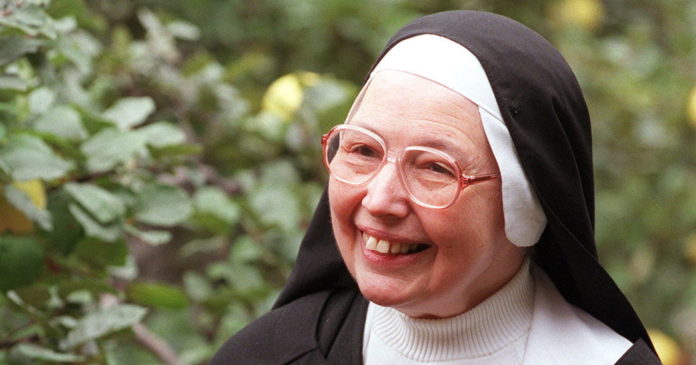Viewers were astonished and delighted, especially at some of her uninhibited expressions of rapture. Of a postcoital self-portrait by Sir Stanley Spencer with Patricia Preece, Sister Wendy confessed, “I love all those glistening strands of hair, and her pubic hair is so soft and fluffy.”
It was a sensation, widely quoted. Frank Bruni, in The Times, said, “The incongruity of such passionate and often sensuous statements coming from a hunched, bespectacled, 67-year-old nun is the secret to much of Sister Wendy’s charm and success.”
Wendy Mary Beckett was born in Johannesburg on Feb. 25, 1930, to Aubrey and Dorothy (Sheehan) Beckett. Her father was a physician. She is survived by a brother, Wendell.
From an early age she intended to become a nun, and at 16 she joined the Sisters of Notre Dame de Namur, a teaching order, as Sister Michael of St. Peter. She became Sister Wendy after Vatican reforms relaxed formalities.
She studied literature at Oxford in the early 1950s, living in a convent and observing its strict code of silence for four years. She graduated at the top of her class. Returning to South Africa, she taught for 15 years at a Cape Town convent and later lectured at Johannesburg’s University of Witwatersrand.
After suffering three grand mal seizures and learning that she had a form of epilepsy, she received Vatican consent to give up teaching for a life of solitude. In 1970, she returned to England and moved into the trailer at the Carmelite Monastery.
Sister Wendy eventually wrote some 25 books, including collections of poetry and meditations, and made a dozen documentaries, many released on DVD. She always returned to the austere seclusion that was her home for nearly a half-century, although her trailer was upgraded in 1994.
“The sisters worried about the lack of insulation, so they put up a small mobile home, which has a lavatory, bathroom and light fittings,” she told The Telegraph of London in 2010. “I have an electric kettle, fridge, warming oven and night storage heater, so my life is as comfortable as it needs to be.”
Source : Nytimes














